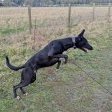-
Content Count
355 -
Joined
-
Last visited
-
Days Won
1
Content Type
Profiles
Forums
Gallery
Articles
Gun Dealer's and Fieldsports Shop's
Reloading Room
Blogs
Calendar
Store
Classifieds
Everything posted by Luckee legs
-
Unfortunately I have to completely agree with you. ......
-
Must admit they do heal well if the vet is good.
-
There are some awesome whippets out there. If they look right and the parents work and or race then they probably are right But...for me it's possible to have too much prey drive and my one is on the lead more than he'd like. At 22 inches with paper thin skin there's a few situations which would lead to a massive vets Bill. Be careful
-
It's an interesting question. As wild polecats live alone but that's a lot to do with prey availability. In captivity I've always had at least two ferrets and up to 10 and they always find at least one soulmates in a group and benefit from play etc. in the group. Castrated hobs are usually very friendly and the best bet to fit into a group IMO. As you have a Jill another Jill should be OK but just be aware sometimes Jill's don't get on with each other. You should be able to find a young hob but make sure you budget for and act quickly to get him castrated as the Jill will be in seas
-
Hopefully she works out for you. On the timid nature; be prepared to give her time, maybe a lot of time. For example; I have taken in two ferrets this winter (different occasions) the jill is a good worker but even after 3 months with me she has days when she wants to hide in her cage or one of the pipes in the run. The male took 5 weeks before he would come to me to be picked up. the first two weeks I had to force the issue and get him out of his sleeping area.
-
F...k me that is a risk. In the winter we can only canicross them at night and are wearing headlamps. You can only imagine what happens if they notice any eye shine or movement I once, and once only, ran those two on a splitter lead at night. We were with some friends canicrossing and the whole route was off road. It was a horror story for me, getting pulled over, constantly trying to apply the brakes. My muscles were so sore I couldn't run for a week after that
-
Good point. Canicross in my experience makes life difficult as I find they are willing to pull when they fancy. That means you are often correcting them. Now assuming the lead training went well, then that discipline should be instilled in them before they are old enough to even start canicross so they will walk fine in calm situations. Just not so good when walking to a ferreting spot or a field gate when lamping
-
We run ours in canicross harnesses. Once they are a year old they can run 5 km if you have carefully introduced them. We start about 6 months doing maybe 1 km in several short runs. Obviously they are already capable of tearing around off lead at that age and the reason for caution is they will pull hard and give everything if you let them when running or biking. In the photos you can see how hard our whippet pulls and that's on a 10km run in the lakes. To be honest I wouldn't run them on a bike until a year. Stick to running with them
-
All good points above on minimum age, post op gap and trialling hob first. I use a vasectomised hob and typically have five to eight ferrets which are in a group most of the year. The one pain in the arse with v hobs is they behave exactly as fully intact hobs so from late winter to early summer they can be aggressive to castrated hobs. Second pain in the arse is they will lose the urge at some point so it's a treadmill of getting the next done and ready in time. I find it's essential to have an additional cage which separates the v hob. Actually works ok as he can then serve one ji
-
-

Came to feed ferrets and half of them dead!
Luckee legs replied to Daleside pest control's topic in Ferrets & Ferreting
Sorry to hear this. You clearly gave them the best opportunity. It never fails to amaze me how ferrets are so incredibly tough, recover quickly from bites and abscesses, rarely get ill but on some occasions fade out almost overnight. Best wishes in tracking down a new team Only suggestion I have is a long way for you but I know Essex ferret welfare in Ongar have quite a few at the moment and some are from working lines. You can find them on FB and website -
You might find pointer crosses in the canicross community. Certainly very popular in European races
-

Came to feed ferrets and half of them dead!
Luckee legs replied to Daleside pest control's topic in Ferrets & Ferreting
I have arranged to take a hob to the vet midday today. He started making audible wheezing noises when breathing yesterday and I can feel his chest is struggling. He's split from the other six as he's only been with me 7 days and I try to isolate new ferrets so hopefully he's not passed it onto the others -

Came to feed ferrets and half of them dead!
Luckee legs replied to Daleside pest control's topic in Ferrets & Ferreting
Bird flu is crossing into a range of mammals that's for sure. I read of several zoos where big cats and other mammals have died. -

Came to feed ferrets and half of them dead!
Luckee legs replied to Daleside pest control's topic in Ferrets & Ferreting
Hope the older ferrets survived. On rehydration I just used sachets from the chemist made up in water. Most of them hated it so I had to syringe it into their mouths. One hob loved the blackcurrant flavour and would drink it happily -

Came to feed ferrets and half of them dead!
Luckee legs replied to Daleside pest control's topic in Ferrets & Ferreting
Really sorry to read this.pretty sure there's nothing you could have done. I have only very rarely had unexplained death of a ferret and never a group. You'll probably know they can get a parvovirus "Aleutian disease". That's a potential In over 40 years I've only once had a whole group ill and one of the symptoms was a severe diarrhea, I had to syringe rehydration fluids into their mouths as they were very weak. Another high risk is human flu virus, I recently had a Jill (kept separate as she was not liked by the others ) die in 48 hours in the week I had a flu vaccine, maybe coi -
Some good advice above and it looks like you've made a good start Definitely the traditional first aid of salt water every day then wound spray. After a few days that needs to stop, assuming it's not infected as the first aid is also killing some of the new tissue I use greyhound specific boots to keep out the mud (the racers use them for corn treatment) which fit much better than standard boots and have the added advantage the dogs hate walking in them so there's less impact. If you can get a cheap standard boot then I'd tape it on So hard to tell from a photo but my gut feelin
-
I imagine it would need to be a very specific role tied to a base and with a marriage partner at home. My friends who've been in the forces all moved several times and all had overseas postings and combat tours. One is a boxer dog fanatic and was keeping three in married quarters, he did five tours in Iraq and Afghan so a lot of stress on the family
-

New down under ferreting video from New Zealand .
Luckee legs replied to toolebox's topic in Ferrets & Ferreting
Thanks for responding, and that's quite pack you have there -

New down under ferreting video from New Zealand .
Luckee legs replied to toolebox's topic in Ferrets & Ferreting
Great filming techniques and quality. And I've learnt something . I've always preferred albinos as they are easier to see, now 56 years after I got my first ferrets, it turns out I could be tying bright ribbons to their collars . Interested why the dogs need GPS collars when rabbiting? Routine when hunting in NZ or do they wander off? -
Sorry to read you lost two ferrets
-
Loving the optimism. Agree there was a time prior to RVHD when rabbits had less sensitivity to myxi. They'd often still get it but survive. Let's hope this type of tolerance builds to RVHD Where I am in East Anglia I see a few pockets with reasonable numbers. Although where I have permission, bonanza days are gone and we catch 20% of even five years ago. Interestingly numbers typically build in summer and then catastrophically collapse but with no carcasses seen. Unfortunately some areas like ThetFord forest seem not to show any signs of recovery
-
Good to know as that's less than an hour from me
-
Completely agree, at times I feel I am anthropomorphic about the best old ferrets but when you compare them to young ferrets I see a massive difference. I really trust them to stay down until the job is done and warren clear (most of my hobs will stay while we dig) and then return, or in hedgerows if a rabbits sneaks away I often spot them tracking it on the surface to the next holes
-
That's tricky injury, I've only had to deal with it once and toe needed amputation, in this case the dog recovered well and could still run well, Our local vets are good, independent and I trust them with dogs and ferrets.....but their opinions on lameness is far from mine, unless the dog can hardly walk it's acceptable For orthopedic surgery in East there is the insurance place at Dick whites near Newmarket. Also East of England practice at Wimpole one of the partners lived 2 doors down from me when he trained at Dick White's and seemed a decent guy. And there is Robert m


